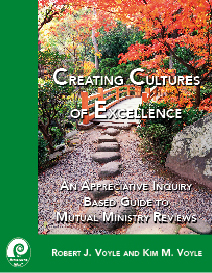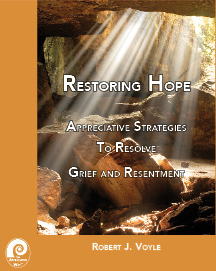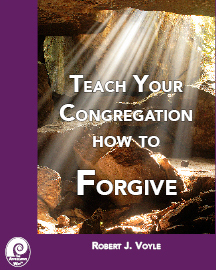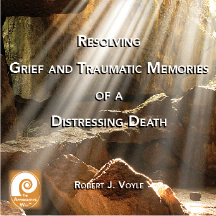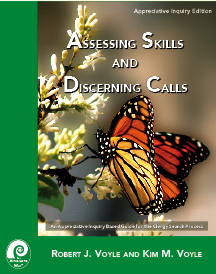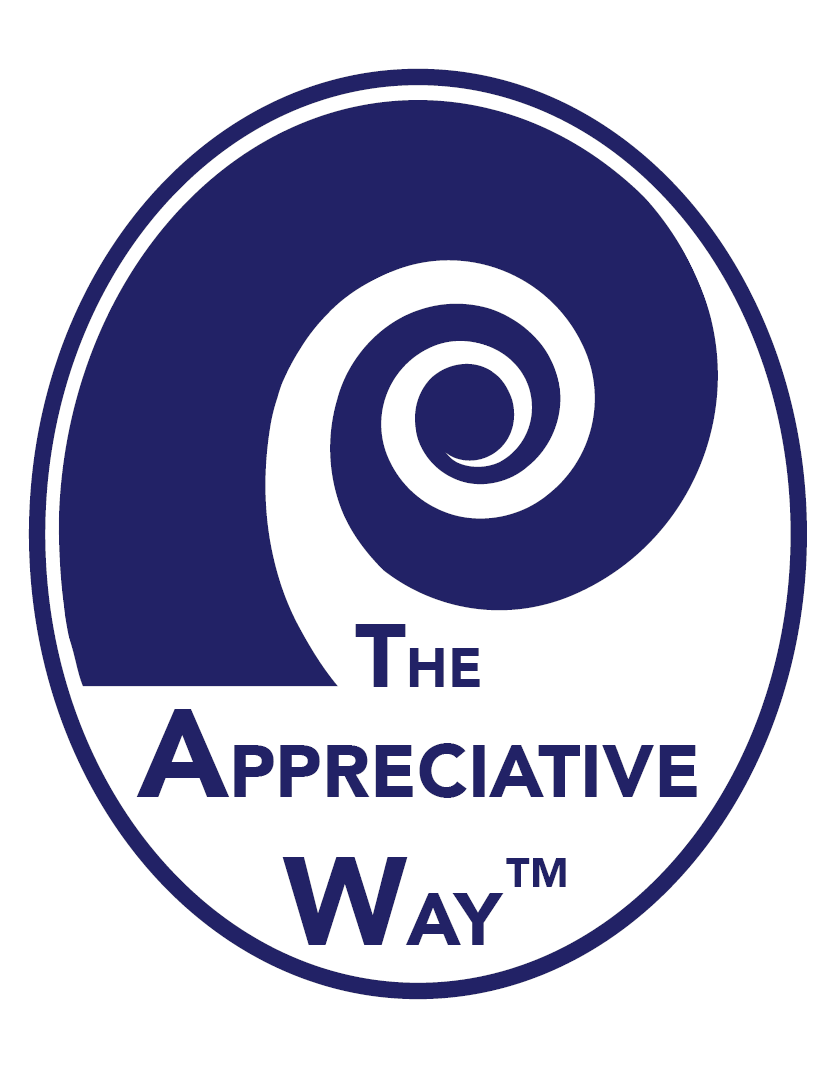

Rob Voyle's Appreciative Way Blog
Additional Articles By Year: 2016 | 2015 | 2014 | 2013 | 2012 | 2011 | 2010
The Challenge of Growing the Church
Posted: December 28, 2011 by Rob Voyle
Just about every church I consult with says: "We want to grow our church." When the church is in a search mode this is what is expressed overtly but the underlying message is: "we want our next pastor to grow the church."
Despite having growth as a goal most churches don't grow.
All sorts of reasons can be conjectured about why the church doesn't grow, most of which are judgments and blame of the people, which does very little to empower them for mission. From my perspective I think the reason churches don't grow is because they don't know how, and that we need to be in the business of teaching people "how" not blaming them for failure.
Two core assumptions of Appreciative Inquiry are:
* People grow toward their images of their future.
* The language we use creates our reality.
When I ask people what the church is I follow-up with a question: What was the first image that briefly flashed across your mind?
Most clergy report "seeing" something about people gathered. Most parishioners report "seeing" a building.
So the language of "church" creates conflict because we are not talking about the same thing. There is another problem in the language of growing and churches.
Buildings don't grow. At least not in any organic sense of life-giving growth.
So the idea of growing the church makes no sense in the intuitive world that is just beyond consciousness if we are "seeing" buildings. Because it makes no sense, it will not empower people for action.
There is another problem with "growing the church." When I inquire about why people want to grow they invariably say: "We need more people... because we need more money to keep the church going." Here the image in consciousness is often the infrastructure to maintain the institution and buildings.
This reeks of self-interest that is the antithesis of Christianity. Its also poor business, Who do you know who would want to join your church to share in your debt?
As I was pondering "growing the church" I realized there was another problem:
I don't think we are called to grow the church I think we are called to make disciples.
Ask your church board: What are we doing to grow the church? What are we doing to grow disciples?
Ask people to pay attention to the images that these questions evoke, because they conjure up very different pictures in consciousness which will lead to very different actions and plans. From my experience growing the church is internally oriented and self-interest based whereas growing disciples evokes images of people in the world engaged in mission.
So the next time I hear someone say: "We need to get more people in the church." I will say: No we just need to empower the people in the church to get out into the world for Jesus sake!
And my Christmas resolution for the coming year is to give up trying to grow the church and simply pay attention to growing disciples.
With Christmas Blessings
Rob Voyle
Check the Training Schedule for the latest listing of leadership training programs.
Doing the Unexpected this Christmas
Posted: December 20, 2011 by Rob Voyle
We live in a violent world where the response to violence is to be more
violent and overwhelm by force that which frightens us. Sometimes the
violence is physical, but in many cases, especially in the church, we
commit intellectual, emotional, and spiritual violence on one another
often with great theological justification. But that is not the way of
love that we get to celebrate at this time of the year.
Just when humanity would expect God to do something more violent and rid
the earth of each one of us God does the unexpected and comes and lives as
one of us. Every element of the incarnation and Jesus' story is one of
doing the unexpected. Born of humble and questionable parentage. And then
he hangs out with the poor, lepers, prostitutes, tax collectors, and any
other marginalized group. It's just not what we expected.
Yesterday I received in the mail a copy of "Sweet Fruit from the Bitter
Tree: 61 Stories of Creative and Compassionate Ways out of Conflict." Its
a wonderful collection of short stories of people who have done the
unexpected in the midst of conflict to create an opportunity for peace and
transformation.
The stories were gathered by Mark Andreas from a variety of sources around
the world. One of the commonalities Mark notes is that in each story the
person maintains their connection with the person they are in conflict
with, but with a twist - the connection is at a place of a shared value
and not the place of conflict.
For example a women is walking home at night and is being followed by a
man that makes her very uncomfortable. She turns and says to her pursuer,
" I am feeling very nervous, would you walk me home." At which point the
man takes her by the arm and walks her home. Sadly later that night the
man raped another woman.
For the woman in the story her doing the radically unexpected called forth
the "gentlemanly" nature of the man something they both could value. If
she had done the expected thing of trying to run or escape it would most
likely have called forth the rapist nature of the man.
When God and humankind are in conflict, God does the unexpected. By living
as one of us Jesus is expressing God's deepest valuing of humanity and
desire to stay connected with us. When this radically unexpected thing is
experienced in our hearts it calls forth the best from us - something that
both we and God can value.
From my experience, people don't change because I hate them, at least
change in the direction I desire. If you find yourself in conflict ask
yourself:
Is my fear and anger getting me what I want?
If it isn't, ask what would be the radically unexpected thing to do. What
is something that we both could share and value?
I pray that in the midst of doing the unexpected you experience the joy of
Christmas.
If you would like to read a complete story from "Sweet fruit from the
Bitter Tree" or find information on how to purchase it please go to
http://realpeoplepress.com/blog/ . For people who love stories and like to
"see" processes in action rather than read books of theory this is an
incredible resource and very much in keeping with this season of peace.
With Christmas Blessing
Rob Voyle
See Restoring Hope for healing and change strategies based in the Appreciative Way.
9/11: Resentment, Forgiveness, and Reconciliation
Posted: September 8, 2011 by Rob Voyle
The Gospel for this Sunday, when many Americans will remember the 10th anniversary of the World Trade Center and Pentagon attacks, asks the question: How many times do we need to forgive?
For many forgiveness is very difficult and often leads to questions about who we should forgive and what we should forgive. Should we forgive Osama bin Laden and the bombers he inspired? Jesus seems pretty clear on the subject and the answer would be, Yes we must forgive. For many Americans forgiving Osama bin Laden would be seen as unpatriotic and a denigration of those who lost their lives in the attacks. Yet our national resentment has led us into two wars and cost billions of dollars that could have been used for saving lives rather than taking lives. May be Jesus was onto something when he said forgive and keep on forgiving.
From my pastoral experience one of the main reasons people don't forgive is they don't know how, and in particular they confuse forgiveness with reconciliation. Added to the problem is a lack of good working definitions of resentment, forgiveness, and reconciliation. Telling people to forgive without teaching people how to forgive is very unhelpful and contributes to their misery.
In the following, longer than usual newsletter, I will define these terms and describe the steps that enable people to forgive. This material is taken from my book Restoring Hope: Appreciative Strategies to Resolve Grief and Resentment which can be found at: http://www.appreciativeway.com/hope/hope.cfm
Resentment, Forgiveness, and Reconciliation
Take a moment and define resentment, forgiveness, and reconciliation.
When dealing with problems such as these it is important to define them in a way that points toward how to engage in the solution.
Resentment
Resentment involves reliving, in the present moment, something from our past. But we remember pleasant things from the past and don't experience distress. To experience resentment we need to do one other thing than simply relive a past event. To create resentment, in addition to reliving, we need to add a demand, in the present moment, that the past event would not have occurred. These demands are often in the form "he or she shouldn't have done, or should have done something."
Regardless of how hard we demand, or how despicable the event was, demanding that something didn't happen doesn't change the fact that the event occurred.
Resentment: A demand in the present moment that a past event didn't happen.
Forgiveness
When forgiving what we let go of is the demand that the past would have been different than it actually was. To release a demand we can convert it into a preference. "I would have preferred that the past event wouldn't have happened." Forgiveness isn't about saying "it didn't matter." These past events do matter, especially when our core values have been violated. Converting a demand into a preference means we get to maintain our integrity and our values.
When we convert the demand into a preference we can explore the values contained within the preference. If the values that were violated are important to us and we would like to keep them in the future we can take a moment and imagine personally sharing that value with someone in the future. It doesn't need to be with the person who has hurt us, but we do need to be willing to give to people what we want to receive from them.
To let go of the past and live fully in the present moment we need to go beyond turning the demand into a preference and surrender the other person and ourselves into the Goodness of God that is fully available now.
I like the idea of the Goodness of God, I never define what that goodness is, but I know deeply that it is good, it is good for me and good for others. When I try to define the goodness of God, for myself and others, I find I contaminate it with all my ego wishes and wants. When dealing with people who have hurt me, my ideas of what would be good for the one who has injured me are generally for my benefit and not for the one who has hurt me.
Forgiveness: Letting go of our demands that the past would be different and surrendering ourselves and others into the Goodness of God in this present moment.
Forgiveness is independent of the person who has injured us. It is how we set ourselves free of things that have happened in the past. Forgiveness is a precursor to reconciliation, but it is very different than reconciliation.
Reconciliation
Reconciliation is an agreement by two people on how they will live together in the future. Reconciliation requires shared values. It would be stupid to be reconciled with someone who does not share our values.
Jesus forgave those who crucified him, and he was never reconciled to the mission or goals of the Romans or the Pharisees.
Martin Luther King Jr. pursued a non-violent dream of equality and he was never reconciled to injustice or to those who perpetrated injustice.
We can forgive Osama Bin Laden and his followers and we do not need to be reconciled to those who create terror.
If we truly want an end to terrorism then you and I must first renounce using fear to motivate anyone, whether they be our spouses, or children, co-workers, parishioners, citizens, politicians, or our enemies. For when we use fear to motivate someone we have become a terrorist in their lives. Only when we give up using fear to motivate people can we lovingly and fiercely challenge those who terrorize us.
When we are in conflict with others we may not be able to achieve reconciliation at the point of the conflict but we may find a deeper place of reconciliation that allows us to peaceably engage with those with who we disagree.
For example in the church we have great conflict over issues of sexuality. Finding reconciliation at that point of the conflict may be impossible but we can find a deeper place of reconciliation in a profound awareness that despite our differences we are both loved by God, and that God's love is not dependent on the rightness of our beliefs, but is dependent purely on the nature of the God of love who loves both the just and unjust. From that deeper place of reconciliation we can find a place of unity that can allow us to live in love with those with who we disagree.
If you have found this understanding of forgiveness helpful you can find more in-depth steps to help people and organizations to forgive those who have hurt them in Restoring Hope: Appreciative Strategies to Resolve Grief and Resentment which is available at: http://www.appreciativeway.com/hope/hope.cfm
Rob Voyle
Living in Love
Posted: May 19, 2011 by Rob Voyle
We get one choice in life: To live in fear or to live in love.
What do you use your religion for: To contain your fear or to liberate love in your life?
In a great sermon the Sunday after 9/11, my associate at the time, Chris Rankin-Williams said: "The challenge of this life is not to stay alive, the challenge of this life is to stay in love."
Unfortunately in so many instances it is easy to fall into fear and make decisions that lead to more things to fear and sadly in many cases death. Congregations that become afraid often become self-absorbed in fear and lose their missional focus and calling to be a blessing in their communities. When nations become afraid they go to war and evoke the very thing that frightens them.
When afraid we may also turn to God and our religion to rescue us from that which frightens us. But that rarely seems to work in any way that is sustainable. Fear controlling religion becomes oppressive and hateful toward those who don't share the same fear based perspective. In its extreme, fear-base religion gives people the moral certainty to annihilate those with whom they disagree.
In the early years of my Christian walk I used my religion in an effort to contain or control my fear. What I discovered is that I can't have less fear or control fear I can only grow in love and that when I am living in love there is no fear. Biblical theophanies begin with the words, "fear not." God was not interested in what I was afraid of. God is interested in what I love and in my living in love.
In the incredible words of a 13 year-old in the midst of a parish wide Appreciative Inquiry summit: "I know my heart is bigger since I have been coming to this church." Likewise, I know that God has liberated my heart to love, to live in love, and to stay in love.
I pray that you and those you love, continue to find each other in love and stay in love.
Rob Voyle
Appreciatively Thinking about Lent and the Ten commandments
Posted: February 11, 2011 by Rob Voyle
Many years ago I was an altar boy and was given a devotional book to prepare myself to receive Holy communion. In the self-examination there was an expanded version of the Ten Commandments with long lists of potential sins I could have committed. Many of them were new to me and I had to look them up in a dictionary to make sure I understood what I should be trying hard not to do - and some of them were really weird and kinky and put strange ideas in my head.
Sadly telling me what sins to avoid didn't help me learn how to love others and seek justice in the world. It kept me a sinner, fearfully preoccupied with my own salvation rather than being concerned for either the temporal or eternal salvation of others.
Several years ago a coaching client was looking for a Lenten discipline and was considering taking two of the Commandments each week and reflecting on how he had failed to keep them. My suggestion to him was to take two commandments each week and reflect on how: keeping these commandments had been a blessing in his life and in the lives of those he loved. In the process he was also able to discover the things that had empowered him to keep the commandments and how to live them as a blessing.
In the Godly Play curriculum the Commandments are described as the "ten best ways to live." If our goal is to live the Commandments and not just keep them, then we need to reflect on how they are a blessing and what enables us to keep them rather than making them a fear based burden of obligation and discouragement devoid of any power or blessing.
Three Lenten Questions
* How has keeping this commandment been a blessing in my life and in the lives of my neighbors?
* What enabled me to keep the commandment?
* Where would I like, and what can I do, to grow this blessing?
Rob Voyle
See Restoring Hope for healing and change strategies based in the Appreciative Way.
All Sustainable Change is an Inside Job
Posted: February 4, 2011 by Rob Voyle
Practicing Incarnational Leadership
Christmas and Easter are the two church celebrations that the church generally does very well. What we often don't do very well is practice the incarnation in our daily ministry. What I often observe in failed change processes is a failure of the incarnation. Instead of growing the change from within the community the change is inflicted on or imposed upon people. Regardless of the intent of the person imposing the changes, such imposed changes are likely to be perceived as a violation of a person's integrity and resisted.
To ensure that our changes are likely to be accepted and sustained over time we need to join the community and from amongst the people grow changes that express the life giving-core of the community. The best way I know to join a congregation is to ask and discover what the community really values and finds life-giving. Intentionally growing these values and life-giving qualities will be perceived and welcomed as a blessing.
Jesus did not come and inflict salvation on us, he came and lived as one of us.
That God was willing to come and live as one of us in Jesus shows us God's incredible valuing and radical acceptance of humanity. From his sharing in our humanity Jesus offers us life and not just any life but abundant life as the children of God.
In the Appreciative Way we make joining people where they are the first step in all change work. It is deeply respectful and allows both the leader and community to co-create with God their desired future.
For further details on how this incarnational approach is used when working with others please see http://www.clergyleadership.com/appreciative-way/appreciative-way.cfm
Rob Voyle
Check the Training Schedule for the latest listing of leadership training programs.
Additional Articles By Year: 2016 | 2015 | 2014 | 2013 | 2012 | 2011 | 2010
Previous Posts By Category
Coaching
- I Saw Satan Fall From Heaven
- Church Growth Makes Absolutely no Sense
- Agents of Change or Agents of God, and What's Christmas Got to Do With It?
- Are You Using the Right Map?
- Coaching: Paul's Conundrum Explained
- Goals Must Be Imaginable
- Coaching Next Steps to Achieving Goals
- Shaman 101: Change the Question
- Changing the Paradigm of Blame
- The Sermon I Need to Hear this Christmas
- Blue Christmas Meditation
- What's the Purpose, What's My Purpose?
- Church Growth and Making Disciples
- Thinking about Language: Are People Assets or Treasures?
- Transfiguration and Agents of Transformation
- Managing Resistance to Change
- Ensuring Change is a Blessing
- Growing Leaders Through Intentional Coaching
- Forget Balance, Get Integrated!
- Get Feed-Forward not Feed-Back
- The Power of Great Questions
Forgiveness
- No Reconciliation Without Repentance
- Moving Mountains of Resentment and Uprooting Mulberry Trees of Misery
- Teach Your Congregation to Forgive: Five Week Lenten program
- Forgiveness and Standing Silent Before the Pilates of this World
- Transforming Anger Into Practical Compassion
- Teaching Forgiveness and Staying in Love
- Stick with Love if You Want Others to Change
- I Tried, But I Just Can't Forgive: Part II
- I Tried, But I Just Can't Forgive: Part I
- The Power to Resolve the Past Is Within You?
- Teach Them How to Forgive this Sunday
- Transforming Victim Narratives: Mark 7:24-30
- 9/11: Resentment, Forgiveness, and Reconciliation
Leadership
- Parishioners and Staff are Treasures not Assets
- Anglican Primates: My Appreciative Way Perspective on the Conflict
- Leadership is About Empowering not Controlling
- Who is the Greatest: Calling Forth the Best
- Discovering the Power of an Ennobling Dream
- Incarnational Leadership
- Core Leadership Competencies: Three Ways of Being a Leader.
- Core Leadership Competencies: The Art of Wise Pruning.
- Core Competencies for Being Your Congregation's Chief: Asking Powerful Questions.
- Core Leadership Competencies: Empowering Others
- Core Competencies for Being Your Congregation's Chief
- Creating Sustainable Change through Incarnational Leadership
- The Challenge of Growing the Church
- All Sustainable Change is an Inside Job
- The Importance of Understanding Your Purpose
- Thinking and Acting Like a Leader
Performance Review
Sermon
- Those Damn Foreigners!
- No, You Don't Want to Take Your Ministry to the Next Level
- Why Be Good
- Teach Us to Pray
- We Are God's Chosen People Not God's Protected People
- Easter and Three Stories When Bad Stuff Happens
- An Appreciative Lent
- Remembering Dr. King
- Find Resurrection this Easter not Reincarnation
- Lent, Coaching, Change and Transformation
- Doing the Unexpected this Christmas
- Appreciatively Thinking about Lent and the Ten commandments
- Thinking about Lent, Sin, and Grace
- Lent and an Appreciative Approach to Repentance
Teaching Love
Tigers
Previous Posts By Date
2016
- The Amur Tigers Need You!
- No Reconciliation Without Repentance
- Confessions and Repentance for Election Failure!
- Those Damn Foreigners!
- Moving Mountains of Resentment and Uprooting Mulberry Trees of Misery
- Teach Your Congregation to Forgive: Five Week Lenten program
- No, You Don't Want to Take Your Ministry to the Next Level
- Parishioners and Staff are Treasures not Assets
- Why Be Good
- Teach Us to Pray
- Good Samaritans and What Is Love Calling Us To Do
- I Saw Satan Fall From Heaven
- We Are God's Chosen People Not God's Protected People
- Forgiveness and Standing Silent Before the Pilates of this World
- Transforming Anger Into Practical Compassion
- Teaching Forgiveness and Staying in Love
- Church Growth Makes Absolutely no Sense
- Anglican Primates: My Appreciative Way Perspective on the Conflict
- Stick with Love if You Want Others to Change
2015
- Agents of Change or Agents of God, and What's Christmas Got to Do With It?
- Teaching People How to Say Yes to Sex
- Leadership is About Empowering not Controlling
- Who is the Greatest: Calling Forth the Best
- What in God's name is Going On Here?
- I Tried, But I Just Can't Forgive: Part II
- I Tried, But I Just Can't Forgive: Part I
- The Power to Resolve the Past Is Within You?
- Are You Using the Right Map?
2014
- Christmas: God the slow learner, but thank Jesus, God learns!
- People in the Church Love Change!
- Teach Them How to Forgive this Sunday
- Coaching: Paul's Conundrum Explained
- Goals Must Be Imaginable
- Coaching Next Steps to Achieving Goals
- Mutual Ministry Valuation
- I Hate Performance Reviews: Creating Cultures of Excellence
- Why did Christianity Flourish: The Power of Your Easter Story
- Easter and Three Stories When Bad Stuff Happens
- Shaman 101: Change the Question
- The Search Process: It is not Dating
- Discovering the Power of an Ennobling Dream
2013
- Incarnational Leadership
- Changing the Paradigm of Blame
- Core Leadership Competencies: Three Ways of Being a Leader.
- Core Leadership Competencies: The Art of Wise Pruning.
- Core Competencies for Being Your Congregation's Chief: Asking Powerful Questions.
- Core Leadership Competencies: Empowering Others
- Core Competencies for Being Your Congregation's Chief
- An Appreciative Lent
2012
- The Sermon I Need to Hear this Christmas
- Blue Christmas Meditation
- Remembering Dr. King
- What's the Purpose, What's My Purpose?
- The Language of Growing in Love
- Church Growth and Making Disciples
- Transforming Victim Narratives: Mark 7:24-30
- Creating Sustainable Change through Incarnational Leadership
- Find Resurrection this Easter not Reincarnation
- Lent, Coaching, Change and Transformation
- Thinking about Language: Are People Assets or Treasures?
- From Transfiguration to Tempting Job Offers
- Transfiguration and Agents of Transformation
- Managing Resistance to Change
2011
2010
- The Importance of Understanding Your Purpose
- Thinking about Lent, Sin, and Grace
- Ensuring Change is a Blessing
- Thinking and Acting Like a Leader
- Growing Leaders Through Intentional Coaching
- Forget Balance, Get Integrated!
- Get Feed-Forward not Feed-Back
- Lent and an Appreciative Approach to Repentance
- The Power of Great Questions
The Appreciative Way
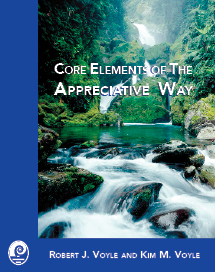
Discover the essentials of the
Appreciative Way in this fast
read format book by
Rob and Kim Voyle.
About the Author
Rob Voyle
The Rev. Dr. Rob Voyle is a leader in the development and use of appreciative inquiry in church and coaching settings.
Rob's Approach to Training
- Helpful: Training must provide practical, sustainable solutions for today's challenges.
- Humorous: Creativity and humor go together as people enjoy new insights.
- Healing: I create opportunities for people to experience transformational insights that lead to new ways of living, working, and being in the world.
>>
See more on Rob's
Helpful, Humorous, Healing
approach to training.
Creating Cultures
of Excellence
Appreciative Inquiry Based Guide to Mutual Ministry Reviews
- Templates and Worksheets
- For Congregations
- Individual Performance
- Coaching Strategies
Restoring Hope
Practical Appreciative Inquiry based strategies to effectively resolve grief and resentment.
Teaching Congregations
How To Forgive
Teaching Forgiveness
- Practical Processes to Teach People How to Forgive
- Five Sermon Outlines
- Five Adult Forums with Exercise Protocols and Scripts
Liturgies for the
Way of Love
An online library of:
- Liturgies
- Blessings and Prayers
- Seasonal Resources
- Retreat Liturgies
Available in pdf and MS Word Docx.
Restoring Hope Video
Watch author Rob Voyle help a client resolve traumatic grief using the strategies outlined in his book: Restoring Hope.
Clergy Search Resource
Over 380 pages of detailed strategies to Assess clergy skills and Discern Calls.
Now available as an online library.

